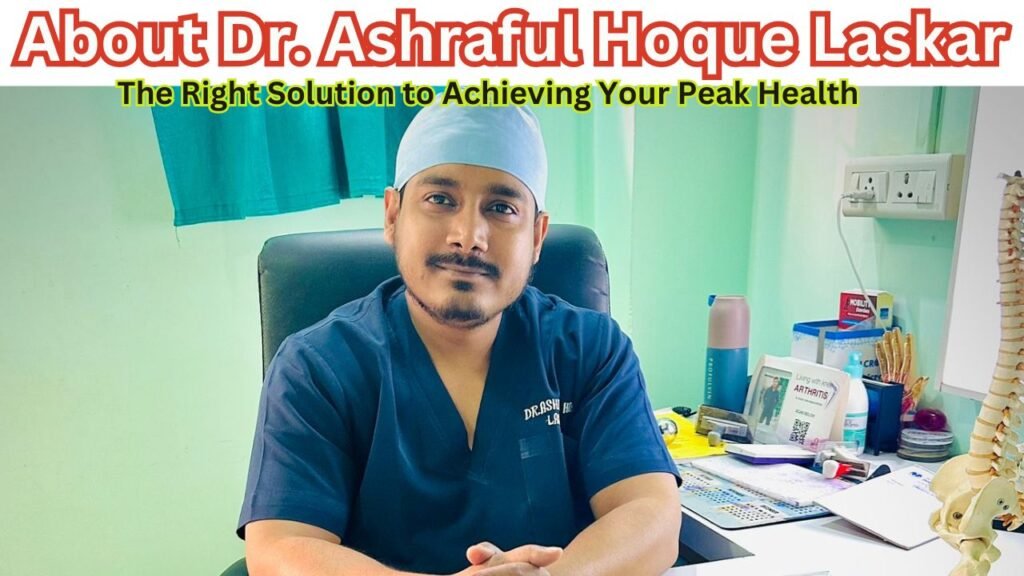
About Dr. Ashraful Hoque Laskar
Dr Ashraful Laskar: an Expert Orthopedic
With a decade of specialized experience, including 5 years dedicated to refining my skills in the medical field of Orthopedics.
I bring a wealth of expertise to my role. Holding degrees in both MS and MBBS, I am equipped with comprehensive knowledge to ensure thorough care for my patients.
My passion for orthopedics is reflected in my contributions at Dewcare Hospital & Research Centre, Nagaon. Committed to delivering personalized and impactful treatment, I am devoted to enhancing the well-being of my patients through a blend of expertise and compassionate care
My Values for patients
As an orthopedic doctor, here are the values that you may want as a patients:
- Compassion: Showing empathy and understanding towards patients’ physical and emotional needs.
- Expertise: Demonstrating proficiency and knowledge in orthopedic medicine to provide the best possible care.
- Integrity: Upholding honesty and ethical standards in all interactions and treatments.
- Patient-Centered Care: Prioritizing the well-being and preferences of patients in decision-making and treatment plans.
- Empowerment: Educating patients about their conditions and treatment options to empower them in their healthcare journey.
- Accessibility: Ensuring that patients have access to timely and quality care, regardless of their background or circumstances.
- Collaboration: Working closely with multidisciplinary teams and involving patients in their care decisions to achieve optimal outcomes.
- Continuous Improvement: Committing to ongoing learning and staying updated with advancements in orthopedic medicine to enhance patient care.
- Respect: Treating patients with dignity, respect, and sensitivity to their cultural and personal beliefs.
- Safety: Prioritizing patient safety and taking necessary precautions to minimize risks during procedures and treatments.
My Responsibility as a doctor:
As an orthopedic doctor, my responsibilities toward my patients include:
- Diagnosis: Accurately diagnosing orthopedic conditions through comprehensive evaluations and diagnostic tests.
- Treatment Planning: Developing personalized treatment plans tailored to each patient’s condition, needs, and goals.
- Surgery: Performing surgical procedures when necessary, with a focus on safety, precision, and optimal outcomes.
- Non-Surgical Management: Providing non-operative treatment options such as medication, physical therapy, and injections.
- Patient Education: Educating patients about their condition, treatment options, potential risks, and expected outcomes to facilitate informed decision-making.
- Follow-up Care: Monitoring patients’ progress post-treatment or surgery, adjusting treatment plans as needed, and providing ongoing support.
- Pain Management: Managing pain effectively through various modalities, ensuring patients’ comfort and quality of life.
- Preventive Care: Advising patients on preventive measures, lifestyle modifications, and exercises to reduce the risk of orthopedic injuries or recurrence of conditions.
- Collaboration: Collaborating with other healthcare professionals, including physical therapists, occupational therapists, and primary care physicians, to ensure holistic care for patients.
- Advocacy: Advocating for patients’ best interests, including advocating for access to necessary treatments, resources, and support services.
In various aspects of patient care by me
As an orthopedic doctor, it’s important to be mindful and careful in various aspects of patient care. Here are some careful considerations:
- Accurate Diagnosis: Ensure precise and thorough evaluation of symptoms and diagnostic tests to avoid misdiagnosis.
- Informed Consent: Clearly explain treatment options, risks, and benefits to patients, obtaining informed consent before proceeding with any procedures.
- Surgical Planning: Diligently plan surgical interventions, considering patient’s overall health, potential complications, and expected outcomes.
- Precision in Surgery: Exercise meticulousness during surgical procedures to minimize risks and optimize outcomes.
- Pain Management: Carefully manage post-operative pain with appropriate medications and techniques, considering individual patient needs and risks of addiction.
- Infection Control: Adhere strictly to infection control protocols before, during, and after surgical procedures to prevent surgical site infections.
- Medication Safety: Prescribe medications judiciously, considering potential interactions, allergies, and contraindications.
- Communication: Maintain clear and open communication with patients and their families, addressing their concerns and ensuring understanding of treatment plans.
- Follow-up Care: Monitor patients closely after surgery or treatment, scheduling regular follow-up appointments to assess healing and address any complications promptly.
- Continued Learning: Stay updated with advancements in orthopedic medicine through continuous education and training, ensuring the delivery of evidence-based care.